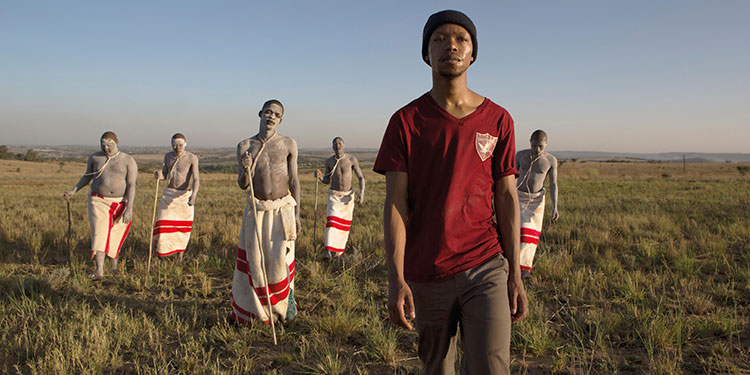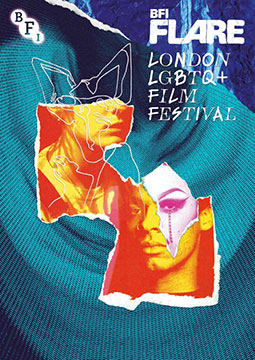
Director: John Trengove
Running Time: 88 mins
Certificate: 15
Release Date: April 27th 2018 (UK)

The Wound has proven intensely controversial in its native South Africa. Some among the country’s Xhosa people (including the ‘King’) objected to its portrayal of their manhood initiation ceremony, which they said was taboo to talk about (others said their objection was really about trying to quash the idea that there are gay Xhosa people). That resulted in the movie being banned. After a public outcry it was swiftly unbanned, but with a certificate that was usually reserved for pornography.
The film certainly isn’t porn, but the controversy has meant it’s remained in the public consciousness over there far longer than it probably would have otherwise. It’s one of the latest examples of the so-called Barbra Streisand effect, where calling attention to something in the hope of making it disappear has the unintended side effect of amplifying it, in this case internationally. That leaves the difficult job on the part of the reviewer of trying to extricate themselves from the cause celebre the movie has become from the movie itself – luckily in the case of The Wound the movie stands up on its own.
(There are also those wondering – perhaps legitimately – whether there’s an issue with a white man directing a movie about a secret native African ceremony, even if they do inure themselves with ideas about only having a Xhosa-speaking cast and including older members of the community who could have spoken out if they had a real problem with that was being shown)
Xolani (Nakhane Touré) is a young Xhosa man who’s gone off to the city for work, but returns back to his homeland’s initiation mountain to mentor a young city boy, Kawnda (Niza Jay Ncoyini), through the circumcision ritual that will make him a ‘man’. However, Xolani isn’t just there to look after his charge, he also wants to see his old friend Vija (Bongile Mantsai). Vija is ostensibly straight and about to settle down with a woman, but he and Xolani have a long-running sexual relationship they’ve never resolved.
To complicate things, despite Kawnda returning to the mountain for the traditional ritual, he’s a city boy who looks at the supposedly age-old ceremonies with scepticism. Although he’s meant to be subservient to his older ‘caregiver’, Kawnda’s attitudes may cause issues for everyone. He challenges Xolani, who is trapped between a desire for something new and a craving for tradition.
The Wound is centred on a very particular ‘rites of passage’ ritual that on the surface will be quite alien to most who watch the movie. However, it does a great job of teasing out the more widely relatable aspects of it. Indeed, the central crux of the story it pretty much universal. Xolani is in love with Vija, but Vija is still clinging on to the idea that he’s solely straight, and that screwing Xolani means nothing beyond friendships. The culture may be different, but the sentiment is the same as it would be anywhere, and it offers an effective way in to what’s going on in this society.
Kawnda may have just been circumcised (in a brutal way which may leave some viewers wondering how they did it so quickly with without chopping off some pretty vital parts) and is pretty entitled and bratty at time, but he almost acts as the voice of reason in an increasingly difficult situation.
I wonder whether the real reason The Wound proved so controversial isn’t because of the gay aspect or the secret initiation aspect, but because it ultimately suggests that the ritual, while useful is some ways, may be harmful in others. That’s backed up by the how the film looks at the overtly masculine aspects of what going on – these are young people supposedly learning what it is to be a man, but the movie shows how toxic this can be and the aggression and pack mentality that can erupt. There are also positives, but the film doesn’t shy away from the problems.
While all that may make it sounds worryingly anthropological, it’s the performances from the main actors that make it work. While it would be easy to paint Vija as the villain of the piece, he’s the anchor around which everyone else revolves, and he does a superb job at that.
Click here to watch the trailer for The Wound
There’s also Nakhane Touré as Xolani, who is incredible in the central role. His face is a mirror to what the film wants to portray and without him it would be nothing. Indeed, he almost single-handedly ensures that the battle not just between tradition and modernity is properly addressed, but also whether the ancient has already been compromises. Indeed, the film ponders whether it needs to be compromised even more in the face of a changing world, and whether what they’re hanging on to are the wrong aspects of the tradition.
The Wound does an effective job of delineating what such a ritual today means from what it might have in the past and what it may do in the future. That ensures that there’s a way in for everyone and that it’s easy to empathise not just with Xolani, but with Vija and Kawnda too. It’s a film where anyone who can’t be qualified as queer is the outsider, but where all the insiders are problematic too, largely because they’ve been socialised to be unable to properly deal with the issues put in front of them. That comes to a dramatic and difficult conclusion in the last few minutes, but the movie has done a tremendous job of showing why things end up the way they do. As a result it’s shocking and powerful, but worryingly inevitable even while it hints at the possibility of something different.
I would love to think that the anger from certain Xhosa people was because of what The Wound ultimately suggests – that the ritual has become tied up in a homophobic, misogynistic orgy of toxic masculinity. However, the reality is it’s unlikely they saw beyond the fact queer people were involved and were revulsed at the idea of it being allied to their community. However, The Wound doesn’t shy away from that or how it might be viewed – including by others in the Xhosa community – and indeed that helps it feel more universal, as it manages to make the viewer consider both what they think is within the ‘community’ and what they don’t.
Overall Verdict: Moving and effective, The Wound manages to both delve deep into a very particular cultural practice while exploring some far more universal issues of sexuality, openness and humanity.
Reviewer: Tim Isaac
Leave a Reply (if comment does not appear immediately, it may have been held for moderation)